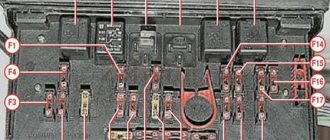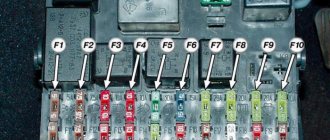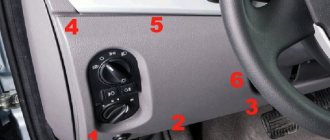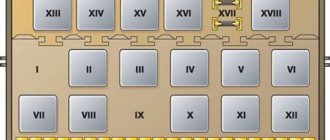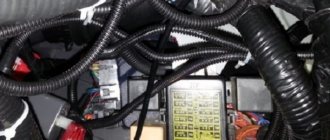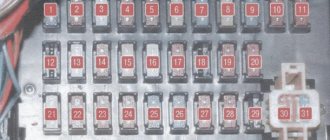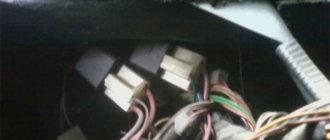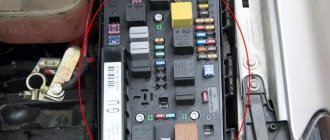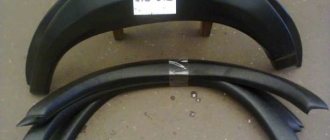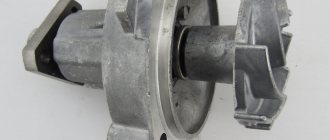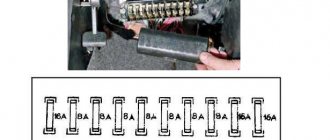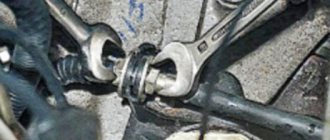Main mounting block with fuses and relays
Diagram of the main mounting block of fuses and relays
Designations of fuses and relays of the mounting block
Open cover of the mounting block Location of the mounting block in the machine
Relay
| Relay no. | vendor code | Purpose |
| K1 | lamp health monitoring relay | |
| K2 | windshield wiper relay | |
| K3 | relay-interrupter for direction indicators and hazard warning lights | |
| K4 | low beam headlight relay | |
| K5 | headlight high beam relay | |
| K6 | additional relay | |
| K7 | rear window heating relay | |
| K8 | backup relay (not installed on VAZ-2110 family vehicles) |
Circuit breakers
| No. prev. | Ampere | Purpose |
| F1 | 5 A | Lighting lamps: license plates, instruments, dimensions on the dashboard, left dimensions, trunk lighting |
| F2 | 7.5 A | Low beam in the left headlight |
| F3 | 10 A | High beam in the left headlight |
| F4 | 10 A | Right front fog lamp |
| F5 | 30 A | Door windows |
| F6 | 15 A | Portable lamp, cigarette lighter |
| F7 | 20 A | Radiator fan, horn |
| F8 | 20 A | Heated rear window |
| F9 | 20 A | Windshield washer and cleaner |
| F10 | 20 A | Reserve |
| F11 | 5 A | Dimension on the right side |
| F12 | 7.5 A | Low beam in the right headlight |
| F13 | 10 A | High beam in the right headlight |
| F14 | 10 A | Fog lamp, left |
| F15 | 20 A | Seat heating |
| F16 | 10 A | Hazard signal, turn signals |
| F17 | 7.5 A | Brake light, ignition switch illumination, interior lighting |
| F18 | 25 A | Cigarette lighter, glove compartment light, interior heater |
| F19 | 10 A | Reversing lamp, brake light monitoring |
| F20 | 7.5 A | Rear fog lights |
Rear fog light fuse
Additional fuse diagram
Location of the additional fuse in the mounting block
This is interesting: How should a pedestrian move along the side of the road?
Tips for tuning VAZ cars and more.
In order for us to decide what will provide alternative power to the power windows. Let's study the standard electrical circuit diagram of the operation of window regulators (Fig. 1).
It shows that power is provided only after the ignition switch is turned on and the additional relay K6 (not indicated in this diagram) and the power window relay (position 11) are activated, which power the power windows through their contacts and fuse F5 (30A). We will provide power to the power windows through the cigarette lighter circuit. To do this, it is best to dismantle the lower left plastic panel near the floor in the passenger’s feet and attach a wire to the cigarette lighter connector. The connection is made with a red-blue wire - this is the “+” contact. (the connection to this wire in the diagram is shown with a black wire)
This is interesting: What do spark plugs do in a car?
Next, stretch this wire in a plastic box between the front seats, bring it to the power window button blocks and connect it to the white-black wire. (common + for all 4 window regulators) In this case, remove fuse F5 from the mounting block to limit the current through it to other energy consumption systems. That is, do not allow alternative power supply to consumers of the on-board network, as well as power windows through the power supply of the cigarette lighter. In this case, the cigarette lighter fuse should be replaced from 15 A to 30 A, since the rating for the power window fuse is higher than that of the cigarette lighter.
Some misconceptions. A jumper in the power window relay block will do nothing for their independent operation. Since before this relay there is still an additional relay K6 which limits the power to the power window relay. But it is prohibited to install a jumper in relay K6 to supply voltage to the power window relay, since it powers not only the power windows but also other systems.
After this modification, the power windows will operate directly from the car’s battery and will not require turning on the car’s ignition to activate them.
Relay and fuse box in the center console
Diagram of the relay and fuse box in the central instrument panel
Designation and numbering in the block
Location of the relay and fuse box in the console
Circuit breakers
| No. prev. | Ampere | Purpose |
| 1 | 15 A | ignition module, controller |
| 2 | 15 A | canister purge valve, vehicle speed sensor, oxygen sensor (heating) and air flow sensor |
| 3 | 15 A | fuel pump, injectors |
Relay
| Relay no. | vendor code | Purpose |
| 4 | electric fan | |
| 5 | electric fuel pump | |
| 6 | ignition |
What is a power window relay?
This device is designed to supply power to the buttons responsible for turning on the window lift mechanism when the ignition key is in the appropriate position. Connecting the device directly to the ignition system can lead to overload of the contacts; In addition, if there is no relay and there are problems with the connection (button sticking), the electric motor may malfunction, and this increases the risk of an electrical short circuit, which causes fires.
The relay for operating the car's window lifters has a hinged type of design; the principle of operation of the system when used is quite simple. When you press the button to raise the window, one contact closes to vehicle ground, moving to the upper position, and the other closes to a positive value. The current passes through the semiconductor diode and the relay winding, after which it is activated, and the switching contact connects the motor to ground, and it turns on. When you press the button to lower the window, the actions occur in the reverse order: the first contact closes to +, the second to ground. Installing a relay is good not only because it will protect the ignition from combustion and reduce the load on the battery, but it can also be done with your own hands.
Relay box in the center console
Diagram of an additional relay block on the left side of the center console
Designation and numbering of relays and control units in the center console
Location of the relay box in the car
Designations
| Element no. | vendor code | Purpose |
| 1 | Central locking control unit | |
| 2 | Immobilizer block | |
| 3 | Rear fog lamp relay |
See also
Model range VAZ 2110
Is the mounting block with relays and fuses conveniently located?
| Rate the usefulness of the material: useful useless Thank you! Your vote has been counted! | Technical Department AG About the authors |
Additionally
| • All Vaz models with a galvanized body • What people ask about Vaz cars • Vaz dismantling shops in your city • Discuss the topic on the forum • See other instructions • on the forum: Auto repair and maintenance | Save this page! |
What is the cause of the problem
Sometimes there is no malfunction as such.
For example, window regulators may fail in severe frost, but other electrics also suffer from similar problems. Therefore, experts advise not to save on buying/renting and heating a garage. But mechanical failures are much more common. If you suspect a breakdown, you first need to check the TsBKE - this is AvtoVAZ’s personal innovation, which operates the electrical package. First you need to make sure the fuse is working. If everything is fine, we disassemble the doors, arm ourselves with a multimeter and measure the voltage at the terminals of the window lift motor. If there is no voltage, then:
- There may be a malfunction of the power window control unit (the button for opening and closing the window located on the door).
- The problem lies in the connection of the wire connectors.
- CBKE refused.
- The window lift motor is stuck or stuck.
- The window lift cable has already outlived its usefulness and needs to be replaced.
- Distortion of the glass itself, while the rest of the system is in full working order.
All of the above breakdowns occur with approximately equal frequency, with the exception of glass distortion, which occurs much less frequently.
Self-detecting a broken power window can be seriously difficult. First, it is difficult to diagnose a CBCE problem. The device is designed in such a way that one of the cables is multifunctional. It could be:
The essence of multifunctionality lies in the fact that some conductors are capable of independently changing polarity if the appropriate command is received from the CBKE. These pairs can simultaneously control side mirrors, central locking, provide power, etc.
To diagnose a malfunction of the CBKE, it is necessary to perform the X1-4 or X1-6 test, which is multifunctional
on a specific car. In this case, you should also press the window up/down button. If the multimeter detects the presence of electricity when the button is activated, then everything is fine. You also need to check sockets No. 1, No. 5, No. 11 and No. 13. If in all cases the presence of current and correct operation of the system are noted, it means that the reason does not lie in the CBKE.
As for the power window control unit, you most likely will not be able to identify the fault yourself. The fact is that it ensures the operation of all such devices in the car, which means you can call it as much as you like, but it will be very difficult to confirm the fact of its failure and find out where exactly it failed. The only real way out in such a situation is to contact specialists at a service station. With a high probability, it will not be possible to do without diagnostic equipment.
Repair is determined by the specific malfunction and is not always possible at home. If we are talking about skewed glass or poor conductor contact, this is not a problem. You can also replace a worn-out window lift cable yourself; you just need to purchase a new one at the nearest car market. If the problem lies in the power window control unit or in the CBKE, then you cannot do without contacting a service center. In this case, independent electronic repair is impossible.
Lada 2000, 78 l. With. — electronics
Omsk
Lada 2111, 2001
49 000 ₽
Bratsk
Lada 2111, 1999
80 000 ₽
Rainbow
Lada 2111, 2001
60 000 ₽
Iskitim
Lada 2111, 2006
70 000 ₽
See more cars on Drome
Participate in the discussion can only registered users.
Login Register
Additional block
It is located under the center console and is covered with a lid. One part is accessible from the right side.
Scheme
Designation
- 15A - Ignition module, controller
- 15A - Canister purge valve, vehicle speed sensor, oxygen concentration sensor (heating), air flow sensor
- 15A - fuel pump, fuel pump fuse, injectors
- Electric fan relay
- Fuel pump relay
- Main relay (ignition relay)
The other part is on the left side of the console:
Scheme
Decoding
- Central locking control unit
- Immobilizer block
- Relay for turning on rear fog lights.
This is interesting: How to check the generator on a VAZ
What is the cause of the problem
Sometimes there is no malfunction as such. For example, window regulators may fail in severe frost, but other electrics also suffer from similar problems. Therefore, experts advise not to save on buying/renting and heating a garage. But mechanical failures are much more common.
If you suspect a breakdown, you first need to check the TsBKE - this is AvtoVAZ’s personal innovation, which operates the electrical package. First you need to make sure the fuse is working. If everything is fine, we disassemble the doors, arm ourselves with a multimeter and measure the voltage at the terminals of the window lift motor. If there is no voltage, then:
- There may be a malfunction of the power window control unit (the button for opening and closing the window located on the door).
- The problem lies in the connection of the wire connectors.
- CBKE refused.
- The window lift motor is stuck or stuck.
- The window lift cable has already outlived its usefulness and needs to be replaced.
- Distortion of the glass itself, while the rest of the system is in full working order.
All of the above breakdowns occur with approximately equal frequency, with the exception of glass distortion, which occurs much less frequently.
Self-detecting a broken power window can be seriously difficult. First, it is difficult to diagnose a CBCE problem. The device is designed in such a way that one of the cables is multifunctional. It could be:
- X1-4.
- X1-6.
The essence of multifunctionality lies in the fact that some conductors are capable of independently changing polarity if the appropriate command is received from the CBKE. These pairs can simultaneously control side mirrors, central locking, provide power, etc.
To diagnose a malfunction of the CBKE, it is necessary to perform the X1-4 or X1-6 test, which is multifunctional
on a specific car. In this case, you should also press the window up/down button. If the multimeter detects the presence of electricity when the button is activated, then everything is fine. You also need to check sockets No. 1, No. 5, No. 11 and No. 13. If in all cases the presence of current and correct operation of the system are noted, it means that the reason does not lie in the CBKE.
As for the power window control unit, you most likely will not be able to identify the fault yourself. The fact is that it ensures the operation of all such devices in the car, which means you can call it as much as you like, but it will be very difficult to confirm the fact of its failure and find out where exactly it failed. The only real way out in such a situation is to contact specialists at a service station. With a high probability, it will not be possible to do without diagnostic equipment.
Repair is determined by the specific malfunction and is not always possible at home. If we are talking about skewed glass or poor conductor contact, this is not a problem. You can also replace a worn-out window lift cable yourself; you just need to purchase a new one at the nearest car market. If the problem lies in the power window control unit or in the CBKE, then you cannot do without contacting a service center. In this case, independent electronic repair is impossible.
